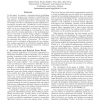Free Online Productivity Tools
i2Speak
i2Symbol
i2OCR
iTex2Img
iWeb2Print
iWeb2Shot
i2Type
iPdf2Split
iPdf2Merge
i2Bopomofo
i2Arabic
i2Style
i2Image
i2PDF
iLatex2Rtf
Sci2ools
125
Voted
DATE
2008
IEEE
2008
IEEE
A Simulation Methodology for Worst-Case Response Time Estimation of Distributed Real-Time Systems
In this paper, we propose a simulation-based methodology for worst-case response time estimation of distributed realtime systems. Schedulability analysis produces pessimistic upper bounds on process response times. Consequently, such an analysis can lead to overdesigned systems resulting in unnecessarily increased costs. Simulations, if well conducted, can lead to tight lower bounds on worst-case response times, which can be an essential input at design time. Moreover, such a simulation methodology is very important in situations when the running application or the underlying platform is such that no formal timing analysis is available. Another important application of the proposed simulation environment is the validation of formal analysis approaches, by estimating their degree of pessimism. We have performed such an estimation of pessimism for two responsetime analysis approaches for distributed embedded systems based on two of the most important automotive communication protocols: ...
Related Content
| Added | 19 Oct 2010 |
| Updated | 19 Oct 2010 |
| Type | Conference |
| Year | 2008 |
| Where | DATE |
| Authors | Soheil Samii, Sergiu Rafiliu, Petru Eles, Zebo Peng |
Comments (0)

